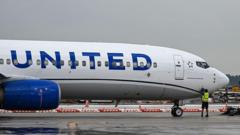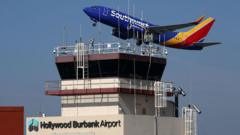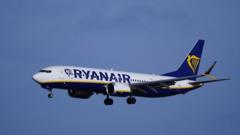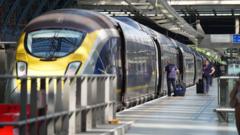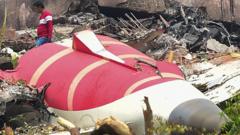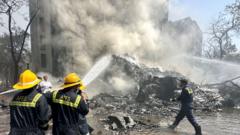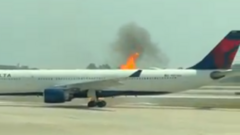A strike by Air Canada flight attendants has led to a complete suspension of the airline's flights, affecting around 130,000 passengers daily.
Air Canada Flight Attendants Strike Ground Hundreds of Flights

Air Canada Flight Attendants Strike Ground Hundreds of Flights
Air Canada halts operations as cabin staff strike disrupts travel for thousands.
The industrial action initiated by the union representing over 10,000 Air Canada cabin crew began early Saturday morning at 00:58 ET. The airline promptly announced the halt of all operations, including flights offered by its budget subsidiary, Air Canada Rouge, and urged passengers to avoid heading to the airport unless they were using other airlines.
Affected travelers can expect widespread disruption, with the airline estimating around 500 flights each day will be canceled. Air Canada's announcement follows a night of considerable cancellations, wherein over 600 flights, impacting over 100,000 passengers, were called off in preparation for the strike.
The flight attendants are advocating for better pay, specifically requesting payment for duties performed while the aircraft are on the ground, in addition to higher salaries. Air Canada has proposed a total compensation increase of 38% over four years, including a 25% raise in the first year; however, the union, CUPE, argues that this offer is insufficient, falling below inflation rates and market value while still leaving workers unpaid during key work hours, including boarding and waiting periods.
In recent weeks, union members overwhelmingly voted, with a 99.7% majority, in favor of the strike, prompting calls for the airline to return to the negotiation table. Canadian jobs minister Patty Hajdu has urged both parties to resolve their issues amicably and had been approached by Air Canada to suggest government involvement for binding arbitration.
CUPE maintains they have been negotiating diligently for over eight months, but they claim Air Canada has not exhibited the same commitment, instead seeking outside intervention to bypass direct negotiations. In a statement, the union highlighted their collective strength in calling for fairer treatment, rejecting the airline's approach to seek government intervention to mitigate their bargaining rights.
Affected travelers can expect widespread disruption, with the airline estimating around 500 flights each day will be canceled. Air Canada's announcement follows a night of considerable cancellations, wherein over 600 flights, impacting over 100,000 passengers, were called off in preparation for the strike.
The flight attendants are advocating for better pay, specifically requesting payment for duties performed while the aircraft are on the ground, in addition to higher salaries. Air Canada has proposed a total compensation increase of 38% over four years, including a 25% raise in the first year; however, the union, CUPE, argues that this offer is insufficient, falling below inflation rates and market value while still leaving workers unpaid during key work hours, including boarding and waiting periods.
In recent weeks, union members overwhelmingly voted, with a 99.7% majority, in favor of the strike, prompting calls for the airline to return to the negotiation table. Canadian jobs minister Patty Hajdu has urged both parties to resolve their issues amicably and had been approached by Air Canada to suggest government involvement for binding arbitration.
CUPE maintains they have been negotiating diligently for over eight months, but they claim Air Canada has not exhibited the same commitment, instead seeking outside intervention to bypass direct negotiations. In a statement, the union highlighted their collective strength in calling for fairer treatment, rejecting the airline's approach to seek government intervention to mitigate their bargaining rights.


